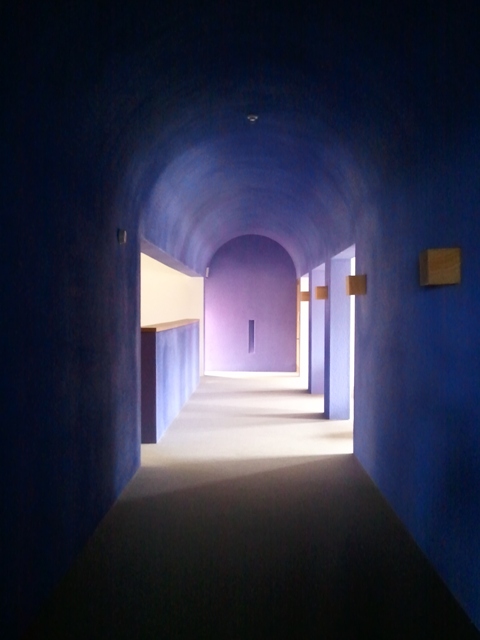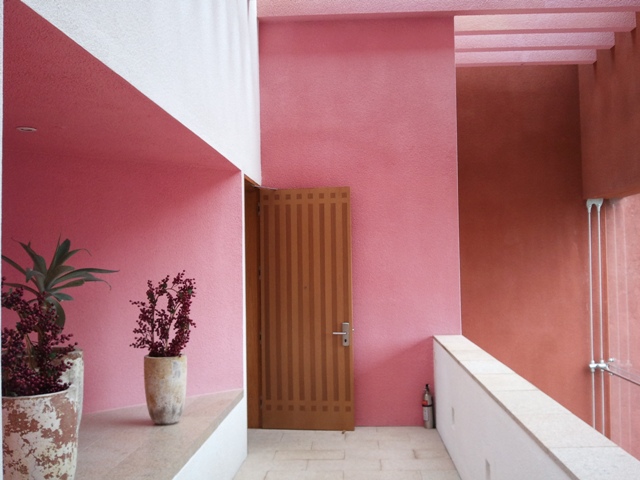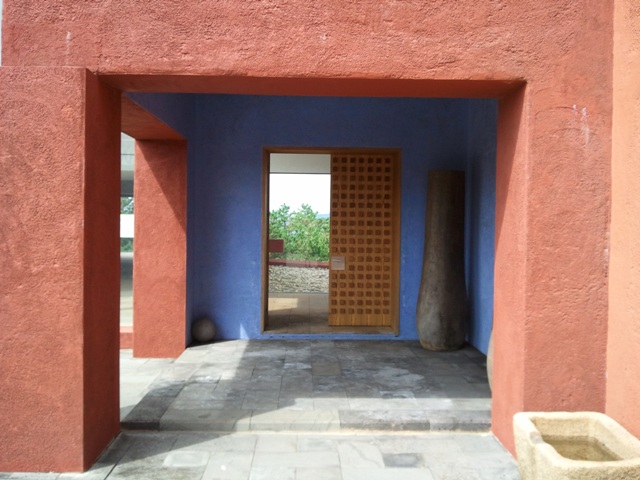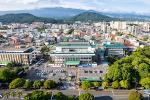- Internationally recognized architecture demolished
 |
||
| The Casa del Agua was fiercely defended, but to no avail. Photo by Anne Hilty | ||
Casa del Agua is no more.
Despite numerous efforts to preserve it, the Jungmun structure formally known as The Gallery: Casa del Agua was demolished on March 6.
The architectural marvel was created by the late Mexican architect Ricardo Legorreta. A student of Luis Barragan renowned for his work around the globe, Legorreta (1931-2011) was invited by Jeju to design a model for a hotel to be built adjacent to the International Convention Center.
His design, which won Best Hotel Construction and Design [Americas Property Awards, Bloomberg / New York Times] in 2010, wedded elements of Jeju's nature with Mexican influences, resulting in an integration of cultures.
It was one of only two Legorreta designs in Asia, and the only one with public access.
Following a series of changes in property ownership, Booyoung Ltd., the current owner of the property and hotel-in-construction – but not, curiously, of The Gallery itself – determined to demolish Legorreta's work, and last summer won the right in Jeju municipal court to do so.
The Mexican government protested repeatedly, along with prominent artist and architect organizations in that country, beginning in July of last year. Both the Mexican embassy in Korea and the association for Mexican residents of this country joined in the dispute.
Last August, Jeju Citizens' Preservation Society for The Gallery: Casa del Agua was founded by Jeju Provincial Council member Lee Sunhwa and several of her colleagues, and joined by other members of Jeju community. [Full disclosure: this reporter was also a member.]
Councilor Lee, a member of Jeju government's culture and art committee as well as its foreign advisory group, has been the most vocal and steadfast champion of the architectural wonder throughout the campaign to save it, not only leading the preservation efforts but speaking out repeatedly in Provincial Council sessions and numerous other public venues.
The group held public forums, press conferences, petition signing, and three cultural festivals to raise awareness of Casa del Agua's impending demolition and the need to preserve it for the sake of both art and intercultural relations. They were supported in these endeavors by artists and musicians, scholars of architecture and culture, heritage specialists, members of the Mexican community in Korea, and many more.
 |
||
| The building was the only one of Legorreta's creations in Asia with public access. Photo by Anne Hilty | ||
Also formally protesting the demolition were Jeju Art and Culture Society, Jeju Forum C, Jeju Cultural Heritage Supporters, and several other organizations.
In the end, these efforts failed to change the minds of Booyoung Ltd. or Jeju provincial government.
The demolition, scheduled and canceled repeatedly during the past 9 months, was announced again one week ago. On March 5 Kim Hyung-sun, Jeju's vice governor for administrative affairs, held a press conference regarding this matter. And on March 6, this internationally recognized architectural beauty, a harmony of Jeju and Mexican cultures, was razed to the ground.
Replication of the structure in an alternative location has been suggested, according to Legoretta's original blueprints and funded by public and private donation.
Councilor Lee Sunhwa, in a voice choked with emotion, could only express her despair over the loss of Casa del Agua – and her doubts about the future of Jeju as an international city.
“I'm very sad,” she began, “ and too aware of the limitations in my position as a Council member. Yesterday was the symbolic 'death day' of Jeju culture.”
Numerous angry Twitter messages continue to be received from citizens throughout Korea “who love Jeju,” according to Councilor Lee. “Jeju government must take note of this,” she exhorted, “and must discontinue the use of their meaningless slogan regarding Jeju's relationship with the world.”
 |
||
| The building brought Koreans, Mexicans and other foreigners together as one. Photo by Anne Hilty. | ||
Councilor Lee will continue to fight in Jeju government for increased cultural awareness.
“The 21st century is a cultural era,” she stated, “yet, while the new national government under President Park Geun-hye has identified culture as one of its primary growth industries, Jeju government seems to be going in the opposite direction.”
Councilor Lee would like to express her heartfelt appreciation to all those who supported the effort to preserve Casa del Agua – an endeavor which brought Jeju and mainland Koreans, Mexicans and other foreigners together as one.
To read Councilor Lee's reaction to the destruction of Casa del Agua, click here.
–
Dr. Hilty is a cultural health psychologist from New York who now makes Jeju Island her home.
Anne Hilty eastwest.psyche@gmail.com
<저작권자 © 제주위클리 무단전재 및 재배포금지>






